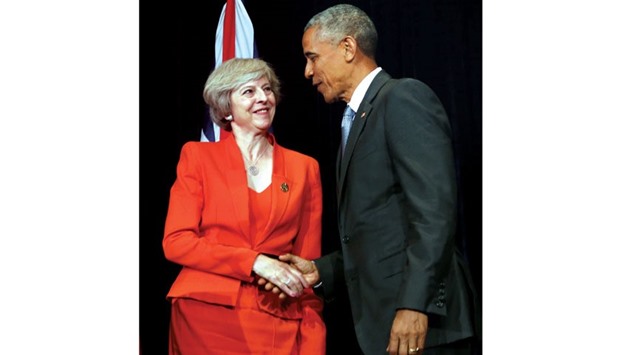Speaking to BBC television, May also ruled out a new general election anytime soon, saying Britain needed stability following June’s referendum vote to pull out of the European Union.
She voiced optimism about the health of Britain’s economy but warned that there could be tough times ahead.
“I’m not going to pretend that it’s all going to be plain sailing,” she said. “I think we must be prepared for the fact that there may be some difficult times ahead.
But what I am is optimistic.”
May, who took office in July after David Cameron quit following the referendum, also confirmed Downing Street briefings that she is not intending to call a general election soon.
This is despite the ruling Conservative party having only a small majority in the House of Commons, which could make it hard to pass controversial laws, and Jeremy Corbyn’s deeply divided opposition Labour lagging in opinion polls and holding a leadership contest.
“I’m not going to be calling a snap election,” May said. “I’ve been very clear that I think we need that period of time, that stability, to be able to deal with the issues that the country is facing and have that election in 2020.”
May is meeting world leaders including US President Barack Obama and China’s Xi Jinping at the G20 summit.
She told the BBC she wanted to “start to scope out” with them how future trade deals would look post-Brexit.
But Obama spoke out strongly against Brexit during the referendum campaign, warning Britons they would go “to the back of the queue” for a US trade deal if they voted to leave.
European Commission chief Jean-Claude Juncker also said yesterday he opposes trade negotiations between Britain and other nations while it remains part of the bloc after Australia said it was about to launch talks on the issue.
May said the government will set out in the coming week how it plans to shape its relationship with the European Union upon leaving the bloc.
Since taking office in July, May and her Brexit minister David Davis have given little detail about what Britain’s future relationship with the EU will look like, saying only they want it to involve curbs on immigration and a good deal on trade.
“He (Davis) will be making a statement to parliament this week about the work that the government has been doing over the summer and obviously how we are going to take that forward in shaping the sort of relationship we want with the EU,” May said.
May has been clear she will not trigger Article 50, the formal process of leaving the EU, this year in order to give Britain time to prepare for upcoming negotiations, but said it would not be “kicked into the long grass”.
She also dismissed comments by Scottish First Minister Nicola Sturgeon that the Brexit vote had shifted the debate on Scottish independence just two years after Scots voted by 10 percentage points to reject it.
Opinions polls did not suggest the Scottish people want another vote, May said.
On the Hinkley nuclear project issue, May said she wanted her security advisers to help review the delayed nuclear power investment from China. May upset Chinese officials in July by delaying a $24bn project that would see French firm EDF build Britain’s first new nuclear power plant in decades with the help of $8bn from China.
Speaking during her first visit to China, May was asked whether she would ask the National Security Council, a team of ministers supported by intelligence officers, to look at the potential security implications of the Hinkley deal.
“I will be doing exactly as you’ve said which is — as you know, I’ll be looking at all the evidence around this issue,” May replied.
Although there is not expected to be a formal review process by the NSC specifically on Hinkley, the comment marked the first official acknowledgement that national security advice would be a factor in her decision.
The initial delay caught investors by surprise and has cast doubt over whether May will continue to court China as a major source of infrastructure investment.
“This is the way I operate,” May earlier told reporters. “I look at the evidence,...take the advice and consider that and come to my decision.”
A final decision is expected later this month, May said.

